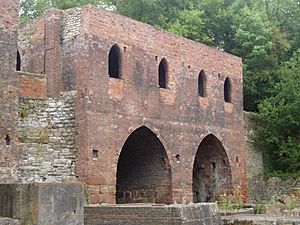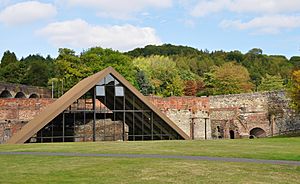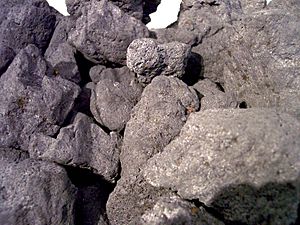Abraham Darby I facts for kids
Abraham Darby, also known as Abraham Darby I, was an important British ironmaster and foundryman. He lived from 1677 to 1717. He came from an English Quaker family that played a big part in the Industrial Revolution.
Darby found a new way to make pig iron. This is a type of iron that comes straight from a blast furnace. He used a fuel called coke instead of charcoal. This was a huge step forward for making iron, which was a key material for the Industrial Revolution.

Contents
Early Life
Abraham Darby was born in 1677 in Woodsetton, England. His father was a farmer and locksmith. Abraham's family were Quakers, a religious group.
His great-granduncle, Dud Dudley, had also tried to make iron using coke. This might have given Abraham the idea to try it himself.
In the 1690s, Abraham became an apprentice in Birmingham. He learned to make brass mills for grinding malt. He saw how coke was used to heat ovens for drying malt. Coke was better than coal because it didn't make the beer taste bad with sulphur. It also saved charcoal, which was harder to find. This gave Darby the idea to use coke in iron furnaces.
In 1699, he finished his apprenticeship. He married Mary Sergeant and moved to Bristol. There, he started his own business making malt mills.
Bristol Innovations
In Bristol, Darby joined other Quakers to start the Bristol Brass Company in 1702. He brought in skilled workers to make brass cooking pots.
He also created a new way to cast pots using "greensand" moulds. Before this, this method was only used for smaller items. This new way allowed him to make many pots and cauldrons quickly. The pots were also thinner and lighter than older ones.
He opened the Cheese Lane Foundry in 1704. At first, he cast brass pots. But by 1705, he started using iron. A young apprentice helped him perfect the sand mould method. Darby got a patent for this new casting method in 1707. His company became very successful selling these new cooking pots. They had a near monopoly in England and Wales.
Moving to Coalbrookdale
In 1708, Abraham Darby decided to focus on making iron. He leased a furnace in Coalbrookdale, Shropshire. He started preparing to use his new ideas there.
His first record book shows that he started making "charked" coal (coke) in January 1709. The furnace began working on January 10, 1709. That year, Darby sold 81 tons of iron goods.

The furnace worked well from the start. The coal from Shropshire was good because it didn't have much sulphur. Some of the melted iron was made into pigs (blocks of iron) and sent to Bristol. But much of it was used right there to cast pots and other iron items.
His business got money from partners like Thomas Goldney II. His brother-in-law, Thomas Baylies, also became a manager.
Company Growth
In 1714, Darby and his partners renewed their lease for the furnace. They then built a second blast furnace. This new furnace started working by 1718 and made even more iron.
The company also planned to take over other furnaces, like the Vale Royal Furnace in Cheshire. However, Abraham Darby passed away before these plans were fully completed.
Death and Legacy
Abraham Darby became ill and died on May 5, 1717. He was 40 years old. He died at his home in Madeley, Shropshire. He had built a new house in Coalbrookdale, but he never got to live in it. He was buried in a Quaker cemetery. His wife died just a few months later.
After Darby's death, his business faced some challenges. His eldest son, Abraham Darby II, was only six years old. His uncle helped manage the company until Abraham II was old enough. Abraham II started helping in 1728 and took over more responsibility later.
Abraham Darby made a huge contribution to the Industrial Revolution. His method of casting pots in sand helped his company succeed for over 200 years.
Using coke to make iron was very important. It meant that iron makers no longer had to rely on charcoal, which came from cutting down trees. This helped save forests. The iron made with coke was used to build steam engines, bridges, and many other inventions of the 1800s. Coke smelting made it possible to produce the large amounts of iron needed to power the Industrial Revolution.
The Abraham Darby room at Friends House in London, UK, is named after him.
See also
|
 | Victor J. Glover |
 | Yvonne Cagle |
 | Jeanette Epps |
 | Bernard A. Harris Jr. |


